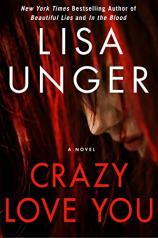Excerpt
Excerpt
Crazy Love You

As I pulled up the long drive, deep potholes and crunching gravel beneath my wheels, towering pines above me, I was neither moved by the natural beauty nor stilled inside by the quietude. I did not marvel at the fingers of light spearing through the canopy, dappling the ground. I did not admire the frolicking larks or the scampering squirrels for their carefree existence. No. In fact, it all made me sick. There was a scream of protest lodged at the base of my throat, and it had been sitting there for the better part of a year. When it finally escaped—and I wasn’t sure when that might be—I knew it would be a roar to shake the world to its core.
It was supposed to have been an auspicious year for me. According to all the astrological predictions—if you believe in that kind of thing—I was to have found security at home, success at work—rewards for all my labors. Megan, the sweet and willowy girl of my dreams—the kind of girl who asked the universe for what we needed, and who dwelled “in a place of gratitude,” and who regularly walked around burning sage and whispering her good thoughts—was no match for the tide of shit that was headed our way.
I should have told her not to bother. Part of me knew that I was only keeping it all at bay—the darkness, the bad luck, the ugly turn of circumstance, the destroyer waiting in the shadows. But I wanted to believe in her, in us. And for a time I did. Maybe it was all worth it, everything that followed, for the moment in which I was able to live in the sun with her. But now that moment makes the dark seem so much deeper, so much less penetrable by any kind of light.
I snaked along the winding, narrow path in my banged-up old Scout, steeling myself for the sight of the house, which waited just around the next bend. It shouldn’t have even been there. I’d finally scheduled it for demolition; should have done so long ago.
Megan and I talked about building our dream home in its place. Or rather she talked about it, and I made noncommittal noises. I might have known the house wouldn’t allow itself to be destroyed. In fact, maybe that was where I’d gone too far into my new life. It was one thing to move on. It was quite another to try to level the past, to pave it over and build it back as you would like it. That wasn’t allowed. Not for me.
And then there it was, as rickety as it was defiant. As fragile as it was indestructible—shutters askew, siding faded and slipping, yard overgrown, porch sagging. As I turned a hard corner with the mean winter sun setting behind me, it rose into view, looked bigger than it had a right to be. The sky behind it was orange and black, the trees dark slashes against the gloaming.
Oh, Meg had plans for this place—our country home, just a few short hours from the city. It was to be our retreat, a place where I would write far from the distractions and temptations of our urban life. No, we wouldn’t have wireless up here. It would have been our place to unplug. But those were her plans, not mine. As far as I was concerned, self-immolation was a more desirable option.
As I came to a stop, the whole place seemed to vibrate with malicious glee. The scream dropped into my belly and became a hard ache in my gut as I climbed out of the truck. How is it possible that I am back here? I asked myself. A place I fled, vowing never to return. Now it’s the only place I have left. Megan would have something to say, like: It’s the universe forcing you to confront the thing you dreaded most. It’s taken everything from you because that’s how important this is. What lesson is it asking you to learn? In fact, that’s precisely what she had said.
Man, I ached to hear that bright and positive voice, to hear that vibration of love and confidence. But now, when I called her, I only got the clipped and professional tone she’d used for her voice mail. I’m not available at the moment. Please leave a message. She wasn’t answering my calls. I left long rambling messages; I wasn’t even sure she listened to them. Her last words to me:
We don’t have anything left to discuss, Ian. Don’t call me until something changes.
I don’t know what that means, I pleaded.
But there was an expression she wore when she looked at me now—sad, disappointed, and angry. And that look was the only answer she gave me before she left me on our bench in Central Park by the Alice in Wonderland statue. It was the last place I’d seen her. I watched her walk away, huddled into herself against the cold. She moved quickly past a little girl who was chasing a boy around the circle. The boy was crying but the girl was laughing, oblivious or indifferent to the fact that the game was frightening him.
I think I called Megan’s name, because the children stopped and looked at me, both of them staring with mouths formed in perfect O’s of surprise. Their nanny hurried over and shuttled them away from me, casting a disapproving look in my direction. But maybe I didn’t say her name. Maybe I said something else. Whatever it was I said, or yelled, Megan hadn’t stopped. She moved faster as if she was afraid, as if she couldn’t wait to be away from me. Why was she afraid of me? How could she be? I had watched until she was absorbed into the throbbing crowd of New Yorkers shuttling through the park on their various ways to various important things.
Now the thud of the hatch closing reverberated like a gunshot in the silence. I had one large black duffel bag, my leather art portfolio, my supply box. I slung the bag over my shoulder and left the portfolio and art supplies for later. The air was frigid, my bare hands raw and painful from just a few moments of exposure.
Then I turned to face the house. For the first time I noticed that lights were burning inside—one upstairs in my old bedroom and one downstairs in the small living room. Outside, darkness had fallen completely and suddenly like a shroud. There was movement inside and I wasn’t in the least surprised. I wasn’t angry or afraid, though I should have been both.
This was it. Rock bottom. The way I saw it, I could lie down, a pile of shattered bones, until I slowly bled out, fading into a blissful, delicious nothingness. Or I could pull myself up, one broken limb at a time, and fight my way back to Megan, to the life we were trying to build. The decision wasn’t as easy as you might think. When the darkness calls, it’s a siren song—magical, hypnotic, and nearly impossible to resist. You want to go. It’s so easy to do the wrong thing, the bad thing. All you have to do is give in.
On the front step, I could smell her, that mingling of perfume and cigarette smoke and something else. A helix of fury and desire twisted in my belly as I pushed through the door. And she stood there, as wild and beautiful as she had always been—her hair a riot of white and gold and copper, her linen skin, her eyes the moonstone blue of terrible secrets. Priss. She took the stance of victory, legs apart, arms akimbo, a slight smile turning up the corners of her mouth. I almost laughed. I let the door slam behind me.
“Hello, Priss.” My voice didn’t sound right. It sounded weak, had the tenor of defeat. She heard it. Of course she did. And her smile deepened.
“Welcome home, asshole.”
Crazy Love You
- Genres: Fiction, Psychological Suspense, Psychological Thriller, Suspense, Thriller
- hardcover: 352 pages
- Publisher: Touchstone
- ISBN-10: 1451691203
- ISBN-13: 9781451691207




